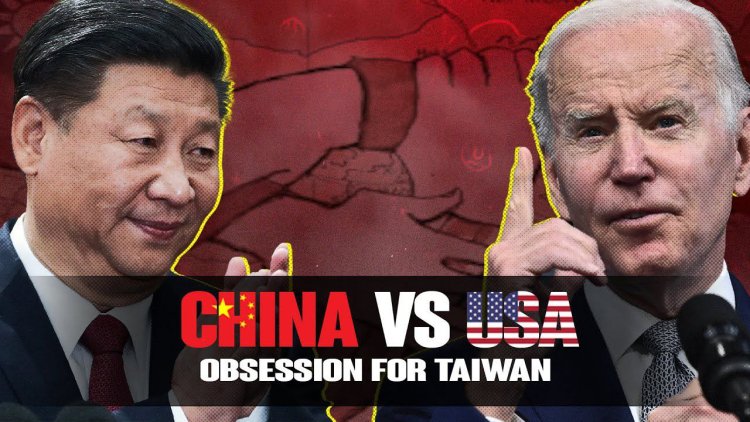China-Taiwan Dispute Explained !!

How did the current round of tensions come about?
• The current round of tensions between China and Taiwan began in 2021 when China observed its National Day to markthe birth of the Peoples Republic of China (PRC).
• Coinciding with the 72nd anniversary celebrations, China flew over 100 fighter jets into Taiwans air defence identification zone, jangling nerves in Taiwan and setting off alarm around the world that it was preparing to take over the island by force.
• Russias invasion of Ukraine in 2022, and China steadfast support of Russia in the face of global criticism has heightened
these fears.
• US-China angle:
In 2020, amid worsening US-China relations over Covid and trade, the State Department sent its highest-ranking delegation till then to Taipei,US House Speaker Nancy Pelosi .During the visit, the Chinese conducted a military exercise in the Taiwan Strait, which separates Taiwan from mainland China,
Where does Taiwan stand in relation to China and the world?
• Taiwan, earlier known as Formosa, a tiny island off the east coast of China.It is where Chinese republicans of the Kuomintang government retreated after the 1 949 victory of the communists and it has since continued as the Republic of China(ROC).
• The island is located in the East China Sea, to the northeast of Hong Kong, north of the Philippines and south of South Korea, and southwest of Japan.
• Thus,What happens in and around Taiwan is of deep concern to all of East Asia.
• Recognition : Taiwan sees itself as a de jure sovereign state but it is largely unrecognised by other countries
• Just 15 countries around the world recognise Taiwan. Most are very small, many are remote island nations.
• Taiwan observes October 10 double 10 as its national day; it was on this day in 1911 that sections of the Manchu army rose in rebellion, leading ultimately to the overthrow of the Qing dynasty and the end of 4,000 years of the monarchy.
Why is China obsessed with Taiwan?
• Taiwan is the largest producer of electronic chips, which are supplied to almost all the industries, from phones to laptops, watches to game consoles, industrial equipment to automotive, and aircraft and fighter jets.
• TSMC (Taiwan Semiconductor Manufacturing Company) is the largest foundry in the world and holds around 65 percent of the global production of chips.
• Any potential conflict with China would completely disrupt the entire supply chain of TSMC and labor availability, and could cause major shortage of electronic chips.
• Additionally, China controls five percent of the global production of chips, which could also be affected.
• This could further impact the already existing supply-demand gap for electronic components.
India-Taiwan relations
• Bilateral relations-The bilateral relations between India and Taiwan have improved since the 1990s, despite both nations not maintaining official diplomatic relations.
• Commercial ties-Both governments have launched efforts to significantly expand bilateral trade and investment, especially in the fields
of information technology (IT), energy, telecommunications and electronics.
• Cultural exchanges-Buddhism is the most widely practiced religion in Taiwan, usually alongside elements of Daoism, and Bollywood films have in recent years gained a reasonably popular following, along with other aspects of Indian culture such as yoga, cuisine
and Indian dance.
• Trade-Taiwans relations with India have increased in breadth spanning trade, research and academia, as well as depth trade ties, which amounted to $7.5 billion in 2019, up from $1 billion in 2000.
• Taipei Economic and Cultural Center in India (TECC)-The Taiwanese government has a representative office namely the Taipei Economic and Cultural Center in India (TECC) which oversees the collaboration on different fronts like education, tourism, culture, the media, and economic development.
• Taiwans increased investments have occurred in the face ofcultural challenges, bureaucratic hurdles, and pressure on India from domestic producers.
• Free trade Agreement-India has suggested the possibility of a free trade agreement with Taiwan although this decision is not without precedentas Taiwan maintains economic cooperation agreements (ECAs) with New Zealand and Singapore, both unofficial relationships.
Way forward
• Long-term approach : Given that India-China relations are not likely to witness a return to normalcy in the near future, India should consider adopting a bold, comprehensive and long-term approach to engage Taiwan.
• QUAD provides a platform for India along with other members to talk about Taiwan.
• Any eventuality in the Cross-Strait will have an impact on India as well.
• India should separate bilateral equations from regional issues.
Check out my youtube explanation on the issue:-
Reference material-Civils daily,think school



























